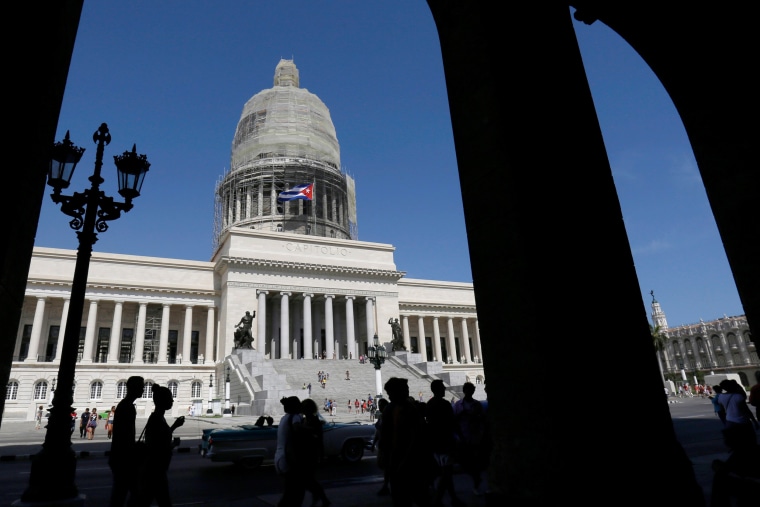MIAMI — Cuba's leaders are setting the stage for its socialist system to survive, with a draft constitution containing the most significant political, economic and social changes since 1959.
Cuban lawmakers approved a draft of a new constitution on Sunday. It would replace the island's 1976 Soviet-style constitution, which officials have said that it no longer reflects changes that have been made in the country.
The new constitution includes the recognition of private property, the creation of the role of prime minister, the right to same-sex marriage and the omission of the word communism in the language.
It excludes a clause from the 1976 constitution saying the ultimate aim is the building of a “communist society.” Instead, it uses the word socialism.
Andy Gomez, a University of Miami former provost and senior fellow at the Institute for Cuban and Cuban-American Studies, said the aim is pretty clear.
“Their key concern has always been keeping political control. The question is, what is going to happen after all these guys are gone? Will this system work? That is why he [Raul Castro] is doing it now. While he's there, he can control all these personalities," said Gomez, referring to the party's current leadership.
Though Miguel Diaz-Canel took over as Cuba's president in April, Raul Castro remains head of the party until 2021. He also heads the constitutional reform commission.

Gomez said Raul Castro is putting in order how the Cuban government will be operating, and one of the key ways that will take place is through the creation of a prime minister position.
Under the new constitution, the roles of head of government and head of state would be split. However, the Communist Party would still remain the most powerful political force in the country.
Economic changes
The draft recognizes private property, which has long been seen by the government as a vestige of capitalism. The current constitution only recognizes state, cooperative, farmer, personal, and joint venture property.
The economic reforms proposed in the charter would provide constitutional recognition for market style changes that have already taken place. Raul Castro introduced market reforms after he took over as Cuba’s leader when his older brother Fidel Castro fell ill in 2006, such as allowing some private businesses. The pace of changes has been slowed, however, amid fears they have allowed Cubans to accumulate wealth, creating inequality and weakened state control.
“The economic part is the most critical,” said Arturo Lopez-Levy, a former analyst with the Cuban Interior Ministry who is now a lecturer at the University of Texas, Rio Grande Valley.
Economic growth in Cuba is weak. The economy grew 1.1 percent during the first half of 2018 and the government has said it needs up to 7 percent annual growth to recover from the collapse of the former Soviet Union and the crisis in Venezuela, two countries who had been important sources of funds and resources such as oil in previous decades.

“This opens the door to other policies that could attract foreign investment,” Lopez-Levy said, adding that Cuban entrepreneurs and foreign investors need to believe the government won’t confiscate and nationalize their business.
Another significant change in the draft of the constitution is legalizing same-sex marriage as one between two individuals, rather than between a man and wife. The news has been met with elation by LGBTQ communities internationally. However, Lillian Guerra, professor of Cuban and Caribbean History at the University of Florida, viewed the announcement as a "diversionary tactic," pointing out there is still political arrests and political repression in the island.
In a marked change, the proposed draft includes age and term limits for presidents. It states they must be under 60 when they take office and can carry out no more than two consecutive five-year terms.
It also proposes recognizing the presumption of innocence in the judicial system.
The charter will be put before the public in a series of meetings during the coming months and then it will be voted on in a national referendum.
On Saturday, lawmakers also approved the Council of Ministers appointed by new President Miguel Diaz-Canel, which keeps most of the ministers from Raul Castro’s government in place. This includes key posts for defense, interior, trade, and foreign relations.
Among the ministers kept in Díaz-Canel’s cabinet are three historic vice presidents, revolutionary commanders Ramiro Valdés and Ricardo Cabrisas, who are both in their 80s as well as Gen. Ulises Rosales del Toro who is 76.
Gomez said that although these are the most important changes since the outset of the revolution, anything that comes out of Cuba he looks at “with a level of skepticism,” particularly since “this is a lot of changes for a system that has made very few changes until recently.”
To Lopez-Levy, the economic changes are the most crucial at this point. "A command economy is destined to fail in the short or mid term. Politically, the government doesn't have a challenge, so it can take more time to make political reform."


